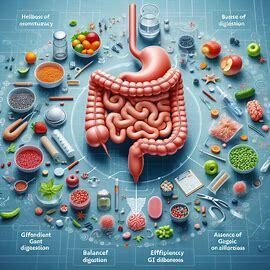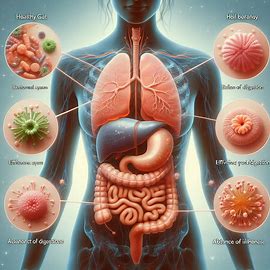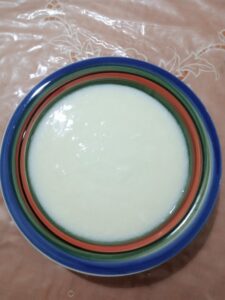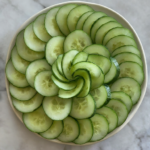Healthy Gut 2025: Awe-Inspiring Knowledge You Must Be Aware of
1 . Healthy Gut Refers to The Well-being of Gastrointestinal (GI) System, which includes your digestive tract from mouth to anus. It encompasses the balance of microorganisms in your gut, the efficiency of digestion, and the absence of GI illnesses. A healthy gut is crucial for overall physical health, immunity, and even mental health12.

2. A Healthy Gut is Essential for a Robust Immune Response:
Healthy Gut Supports Immune Response:
- The gut is home to a large number of immune cells and is often referred to as the “second brain” due to its extensive network of neurons1.
- A diverse and balanced gut microbiota helps regulate the immune system, ensuring it responds appropriately to threats2.
- Probiotics in foods like yogurt and fermented vegetables can enhance the gut’s ability to fight off harmful bacteria and viruses1.
The gut microbiome, which is the collection of microorganisms living in your intestines, plays a significant role in this. It helps break down food, absorb nutrients, and protect against harmful bacteria. A diverse and balanced gut microbiome is associated with a reduced risk of conditions like diabetes, inflammatory bowel disease (IBD), psoriatic arthritis, and even some mental health disorders1.
Maintaining good gut health involves a balanced diet rich in fiber, probiotics, and prebiotics; staying hydrated; managing stress; and getting adequate sleep. Avoiding excessive consumption of processed foods and sugars can also help maintain a healthy gut microbiome12.

Probiotics and prebiotics are both important for gut health, but they serve different roles:
Probiotics are live beneficial bacteria found in certain foods or supplements. They help maintain or improve the balance of good bacteria in your gut. Examples include yogurt, sauerkraut, and other fermented foods1.
Prebiotics, on the other hand, are types of dietary fiber that act as food for probiotics. They help nourish the beneficial bacteria in your gut, allowing them to thrive and function effectively. Foods rich in prebiotics include fruits, vegetables, and whole grains2.
In essence, probiotics are the “good” bacteria that live in your gut, while prebiotics are the “food” that helps these bacteria grow and stay healthy12.
3 . Probiotic-Rich Foods That Can Help Support Your Gut Health:
- Yoghurt: A popular choice, especially for those with live and active cultures.
- Kefir: A fermented milk drink similar to yoghurt but with a thinner consistency.
- Sauerkraut: Fermented cabbage that’s rich in probiotics.
- Kimchi: A Korean dish made from fermented vegetables, typically cabbage and radishes.
- Miso Soup: A Japanese soup made from fermented soybeans.
- Tempeh: A fermented soy product that’s a good source of probiotics.
- Pickles: Fermented cucumbers that can contain probiotics if they’re not pasteurised.
- Kombucha: A fermented tea that’s known for its probiotic content.
These foods are not only delicious but also beneficial for maintaining a healthy gut microbiome123. Remember to check the labels for “live and active cultures” to ensure you’re getting the probiotic benefits. Enjoy incorporating these into your diet!
Yes, gut health issues can indeed play a significant role in overall health and mental conditions. The gut microbiome, which is the collection of microorganisms living in your intestines, has a profound impact on various aspects of your health. It’s involved in digestion, metabolism, and immune function, and it also communicates with the brain through the gut-brain axis1.
Research has shown that an imbalance in the gut microbiome, known as dysbiosis, can lead to a range of health issues, including digestive disorders like IBD and metabolic conditions like obesity and diabetes. Moreover, there’s growing evidence linking gut health to mental health conditions such as anxiety, depression, autism spectrum disorder, and even neurological disorders like Alzheimer’s and Parkinson’s disease23.
The gut produces a significant amount of serotonin, a neurotransmitter that affects mood and is often referred to as the “feel-good” hormone. An unhealthy gut can affect serotonin levels and thus influence mental well-being2. Additionally, stress can damage the gut microbiome, which may exacerbate mental health issues4.
Maintaining a healthy gut through a balanced diet rich in fibre, probiotics, and prebiotics is essential for both physical and mental health. It’s also important to manage stress and get adequate sleep to support a healthy gut microbiome124.
4 . Improving your gut health can have a positive impact on your mental well-being. Strategies to enhance your gut health:
- Eat a Balanced Diet: Include a variety of fibre-rich foods like vegetables, beans, whole grains, and nuts. These help feed the beneficial bacteria in your gut1.
- Probiotic-Rich Foods: Incorporate foods like yogurt, kefir, sauerkraut, kimchi, kombucha, and tempeh into your diet. These contain live cultures that can help balance your gut microbiome23.
- Prebiotic Foods: Consume foods high in prebiotics such as jicama, asparagus, chicory root, dandelion greens, onions, garlic, and leeks. Prebiotics serve as food for the probiotics in your gut3.
- Mindful Eating: Take time to enjoy your meals without distractions. Eating slowly and mindfully can improve digestion and nutrient absorption2.
- Manage Stress: Chronic stress can negatively affect gut health. Techniques like deep breathing, meditation, or yoga can help reduce stress levels2.
- Adequate Sleep: Ensure you get enough quality sleep, as it plays a crucial role in maintaining a healthy gut microbiome4.
By making these lifestyle changes, you can support a healthy gut microbiome, which is linked to better mental health outcomes. Remember to consult with a healthcare professional before making significant changes to your diet or lifestyle.
Probiotics may have a positive effect on mental health conditions such as anxiety and depression. They are believed to influence the gut-brain axis, which is the communication pathway between the gut and the brain. Some studies suggest that certain probiotic strains can help reduce symptoms of anxiety and depression123.
For instance, research has indicated that probiotics like Lactobacillus rhamnosus might help lower anxiety levels by affecting neurotransmitter activity, such as increasing GABA, which is known for its calming effects2. Additionally, probiotics have been shown to reduce self-rated scores for depression, anxiety, and stress in healthy individuals4.
However, it’s important to note that while these findings are promising, more research is needed to fully understand the effectiveness of probiotics for treating anxiety and depression. It’s also recommended to use probiotics as a complementary approach alongside other treatments, such as medication and psychotherapy5.
If you’re considering using probiotics for mental health benefits, it’s best to consult with a healthcare professional to determine the most appropriate approach for your individual needs.
5 . Lifestyle Changes That Can Support Better Mental Well-being:
- Improve Your Diet: Eating whole foods like leafy greens, legumes, whole grains, lean meats, and seafood can provide nutrients important for optimal brain function1.
- Reduce Vices: Managing problem drinking or substance misuse is crucial for mental health1.
- Prioritize Rest and Sleep: Getting sufficient restful sleep is essential for mental health2.
- Get a Dose of Nature: Spending time outdoors and connecting with nature can improve mood and reduce stress1.
- Exercise Regularly: Physical activity can lead to beneficial changes in mood, anxiety, and depression3. It doesn’t need to be structured or long; even short bursts of activity can be beneficial3.
- Manage Stress: Techniques like deep breathing, meditation, or yoga can help reduce stress levels3.
- Connect with Others: Social connections are vital for mental health. Try to maintain relationships with friends and family4.
- Limit Social Media: Reducing time spent on social media can help improve mental well-being4.
- Seek Professional Support: If needed, don’t hesitate to reach out to a mental health professional for support4.
- Practice Self-Kindness: Frame lifestyle changes as self-care rather than self-punishment. A gentle attitude toward yourself can improve mental health and overall outlook4.
Remember, it’s important to find what works best for you and to make changes that you can maintain in the long term. If you’re considering making significant changes to your lifestyle, it’s always a good idea to consult with a healthcare professional.
6 . Incorporating mindfulness into your daily routine can be a transformative practice for mental well-being. Here are some practical steps to get started:
- Start with a Daily Routine: Set aside a specific time each day for mindfulness practice. Consistency is key, so try to make it a habit1.
- Simple Meditation: Begin with a short meditation session. Sit comfortably, focus on your breath, and observe your thoughts without judgment2.
- Open Awareness: Engage in activities like eating, walking, or showering with full attention to the sensations and experiences of the moment2.
- Mindful Productivity: Approach your daily tasks with mindfulness, focusing on one thing at a time and doing it with full attention3.
- Create a Mindful Environment: Designate a space in your home for mindfulness practice, free from distractions3.
- Reflect on Your Journey: Take time to reflect on your experiences and progress with mindfulness3.
- Practice Gratitude: Incorporate gratitude into your routine by acknowledging things you’re thankful for each day3.
- Set Intentions: Begin your day by setting intentions for what you want to achieve or how you want to feel.
- Use Apps or Guided Meditations: There are many apps and online resources that offer guided meditations and mindfulness exercises.
- Mindful Breathing: Practice mindful breathing throughout the day, especially during stressful moments.
Remember, mindfulness is about being present in the moment and accepting it without judgment. It’s not about achieving a state of perfection but rather about becoming more aware of your thoughts, feelings, and surroundings. Start small and gradually increase the duration and frequency of your practice as you become more comfortable with it.
Household items commonly used in Asian countries during the summer season can be quite beneficial for gut health. Here’s how they can help:
- Curd: It’s a rich source of probiotics, which are live bacteria that support a healthy gut microbiome. Probiotics in curd can improve digestion and boost the immune system123.

- Lassi: A yoghurt-based drink that also contains probiotics. It’s hydrating and can help maintain gut health during the hot weather1.

Lassi
- Sattu: Made from roasted gram flour, sattu is high in fibre and protein. It aids digestion and has a cooling effect on the body, making it ideal for summer consumption45.
- Cucumber: High in water content and fibre, cucumber can help keep you hydrated and support digestive health4.

Cucumbers
Lemon Water: Lemon water is refreshing and can aid digestion. The lemon’s acidic properties stimulate digestive enzymes, while its vitamin C content supports overall health4.

These items are not only refreshing but also contribute to maintaining a balanced gut microbiome, which is crucial for overall health, especially during the summer when dehydration and heat-related stress can impact gut function. Enjoy these traditional remedies to stay cool and support your gut health!
Traditional foods and drinks from various cultures are known for their gut health benefits. Here are some examples:
- Fermented Foods: These include yogurt, kefir, sauerkraut, kimchi, and kombucha. They contain probiotics that can help balance the gut microbiome12.
- Fiber-Rich Foods: Foods high in fibre like beans, lentils, berries, whole grains, vegetables, and fruits support the growth of healthy gut bacteria2.
- Plant-Based Foods: A diet rich in plant-based foods can increase the diversity of gut bacteria and promote overall gut health2.
- Prebiotic Foods: Prebiotics are non-digestible fibers that feed the beneficial bacteria in your gut. Examples include garlic, onions, leeks, asparagus, bananas, and oats2.
- Tea: Certain teas, especially those high in antioxidants like green tea or herbal teas like peppermint or ginger tea, can be soothing for the digestive system2.
Incorporating these traditional foods and drinks into your diet can be a delicious way to support your gut health. Remember to choose minimally processed options to get the most benefits.
Gut-friendly snacks are perfect for on-the-go and can help maintain a healthy digestive system. Here are some options:
- Pistachios: These nuts are rich in fiber and can promote the growth of beneficial gut bacteria1.
- Kefir Smoothie: Kefir is a fermented yogurt drink with probiotics that support gut health1.
- Avocado Toast: Avocados are high in fiber, which is great for digestion1.
- Apple and Peanut Butter: Apples provide fiber, and peanut butter adds protein and healthy fats1.
- Overnight Oats: Oats are a whole grain that’s high in fiber and can be prepared in advance1.
- Chia Pudding: Chia seeds are packed with fiber and omega-3 fatty acids1.
- Greek Yogurt: It’s a good source of probiotics and protein1.
- Berries and Cottage Cheese: Berries are rich in antioxidants, and cottage cheese provides protein1.
These snacks are not only nutritious but also convenient for busy lifestyles. Enjoy them to support your gut health!
Imbalances in Gut Microbiota Lead to Immune Dysregulation:
- When the balance of good and bad bacteria in the gut is disrupted, it can lead to an overactive or underactive immune response3.
- This dysregulation can cause chronic inflammation, which is linked to various diseases, including autoimmune disorders4.
- A healthy gut microbiome can prevent unnecessary inflammation by educating immune cells on what to attack and what to ignore5.
Maintaining a healthy gut through diet, lifestyle, and possibly probiotics can support a strong immune system and help prevent immune-related diseases. It’s a fascinating area of research with significant implications for our overall health. Remember, always consult with a healthcare professional before making changes to your diet or health regimen.
Improving your gut health is a great way to support your immune system. Here are some strategies to enhance your gut health:
- Eat Plenty of Plants: A diet rich in colorful fruits and vegetables provides fibre and nutrients that support a healthy gut microbiome1.
- Include Fermented Foods: Foods like yogurt, kefir, sauerkraut, and kimchi contain probiotics that can help maintain a balanced gut microbiota1.
- Consume Prebiotic Foods: Prebiotics are non-digestible fibres found in foods like garlic, onions, bananas, and whole grains. They feed the beneficial bacteria in your gut1.
- Healthy Fats: Incorporate healthy fats such as olive oil, avocado oil, and omega-3-rich fish into your diet to support immune function1.
- Stay Hydrated: Drinking plenty of water helps maintain the health of your digestive system.
- Manage Stress: Chronic stress can negatively impact gut health, so it’s important to find stress-reduction techniques that work for you.
- Regular Exercise: Physical activity can help reduce inflammation and improve gut motility.
- Adequate Sleep: Quality sleep is crucial for overall health, including the health of your gut.
- Avoid Processed Foods: Limiting processed foods and added sugars can help reduce inflammation and support a diverse gut microbiome.
- Consider Probiotic Supplements: If you’re unable to get enough probiotics from your diet, supplements can be an option2.
Remember, it’s important to make these changes gradually and consult with a healthcare professional before starting any new dietary or lifestyle regimen.
Disclaimer: The contents of this article are intended to raise awareness about common health issues and should not be viewed as sound medical advice for your specific condition. You should always consult with a licensed medical practitioner before following any suggestions outlined in this article or adopting any treatment protocol based on the article’s contents.
If you enjoyed this article, please like and share it with your friends, and don’t forget to subscribe for more great content!
The Essence of Olive and Olive Oil: Accurate Health Elixir for All in 2025